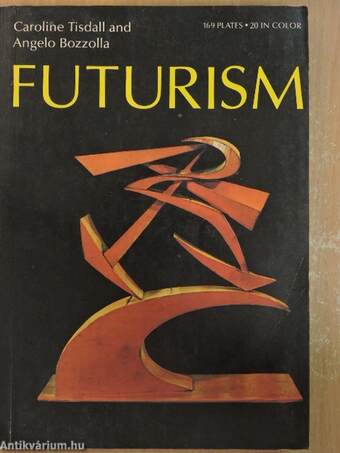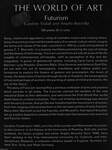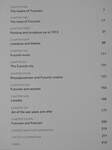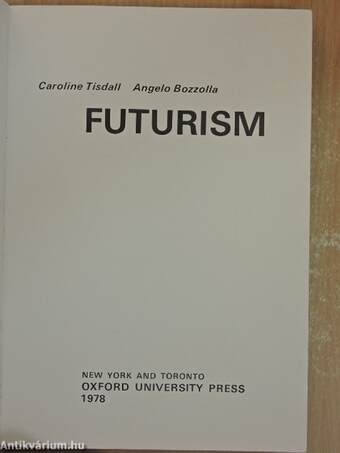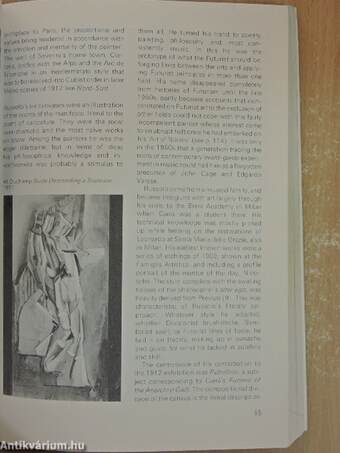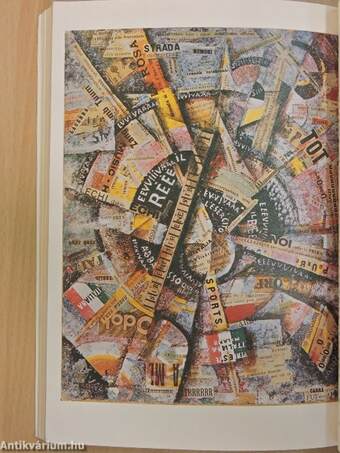1.062.439
kiadvánnyal nyújtjuk Magyarország legnagyobb antikvár könyv-kínálatát

VISSZA
A TETEJÉRE
JAVASLATOKÉszre-
vételek
Futurism
| Kiadó: | Oxford University Press |
|---|---|
| Kiadás helye: | New York-Toronto |
| Kiadás éve: | |
| Kötés típusa: | Ragasztott papírkötés |
| Oldalszám: | 216 oldal |
| Sorozatcím: | The World of Art |
| Kötetszám: | |
| Nyelv: | Angol |
| Méret: | 21 cm x 15 cm |
| ISBN: | 0-19-519980-4 |
| Megjegyzés: | Színes és fekete-fehér reprodukciókkal. |
naponta értesítjük a beérkező friss
kiadványokról
naponta értesítjük a beérkező friss
kiadványokról
Fülszöveg
THE WORLD OF ART Futurism Caroline Tisdall and Angelo Bozzolla 169 plates 20 in color Noisy, violent and aggressive, using all available means and creating others, Italian Futurism proclaimed the bankruptcy of an artistic culture which clung to the forms and values of the past. Launched in 1909 by a poet and publicist of genius, F. T. Marinetti, in a rousing manifesto proclaiming the joys of energy and the beauty of technology, Futurism carried from art into all areas of life the insights of contemporary philosophy, with its perception of flux and disintegration. A group of spectacular talents, including Carlo Cárrá, Umberto Boccioni, Luigi Russolo, Giacomo Balla, Gino Severini and Antonio Sant'Elia, set out with the aid of newspapers, manifestos and riotous public performances to explore the theatre of gesture and provocation, the music of noises, the destruction of syntax through words-in-freedom, the emancipation of lust (and perhaps of women), the painting of states of mind and... TovábbFülszöveg
THE WORLD OF ART Futurism Caroline Tisdall and Angelo Bozzolla 169 plates 20 in color Noisy, violent and aggressive, using all available means and creating others, Italian Futurism proclaimed the bankruptcy of an artistic culture which clung to the forms and values of the past. Launched in 1909 by a poet and publicist of genius, F. T. Marinetti, in a rousing manifesto proclaiming the joys of energy and the beauty of technology, Futurism carried from art into all areas of life the insights of contemporary philosophy, with its perception of flux and disintegration. A group of spectacular talents, including Carlo Cárrá, Umberto Boccioni, Luigi Russolo, Giacomo Balla, Gino Severini and Antonio Sant'Elia, set out with the aid of newspapers, manifestos and riotous public performances to explore the theatre of gesture and provocation, the music of noises, the destruction of syntax through words-in-freedom, the emancipation of lust (and perhaps of women), the painting of states of mind and motion, the city of the future. The story of Futurism exemplifies a perilous confusion of aims and practice which persists in art today. The Futurists claimed the workers of the new industrial State as their defenders, and welcomed the First World War as the death-blow to a hated civilization. Their cult of heroic technology was shared with the early Soviets. And yet the war transformed the movement's direction, from free-ranging cultural anarchism to the narrower politics of early Fascism. Many died; Marinetti joined the Fascists; and Mussolini, that lapsed Socialist, set up a stable despotism instead of the fresh start that had been the anarchist and Futurist dream. Caroline Tisdall (born 1945), art critic ofthe London and Manchester Guardian, is alsó Lecturer in Art History at the University of Reading. Both she and her husband, the Italian sculptor and writer Angelo Bozzolla (born 1938), have been working in the Free International University for Creativity and Interdisciplinary Research, a collective initiative based in England, Northern Ireland, Eire, Sicily and West Germany. VisszaTémakörök
- Idegennyelv > Idegennyelvű könyvek > Angol > Művészetek > Művészettörténet, általános
- Idegennyelv > Idegennyelvű könyvek > Angol > Művelődéstörténet
- Művelődéstörténet > Civilizációtörténet > Egyéb
- Művelődéstörténet > Kultúra > Története
- Művelődéstörténet > Eszmetörténet > Futurológia
- Művelődéstörténet > Átfogó művek, tanulmányok
- Művészetek > Művészettörténet általános > Idegen nyelv > Angol
- Művészetek > Művészettörténet általános > Művészettörténet > Külföldi
- Művészetek > Művészettörténet általános > Korszakok, stílusok > XX. század > Avantgard
- Művészetek > Művészettörténet általános > Tanulmányok > Nemzetközi > Egyéb
Megvásárolható példányok
Nincs megvásárolható példány
A könyv összes megrendelhető példánya elfogyott. Ha kívánja, előjegyezheti a könyvet, és amint a könyv egy újabb példánya elérhető lesz, értesítjük.



